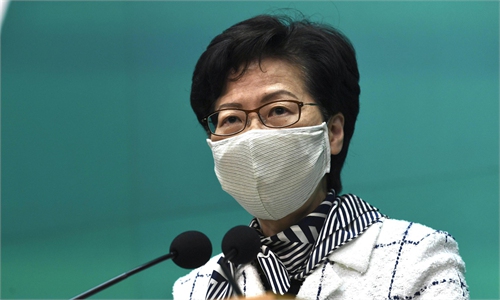US sanctioning measure backfires on itself
Suspension of bilateral agreement with Hong Kong hurts US firms more

Hong Kong. Photo: VCG
The US Department of State decided to terminate three agreements with Hong Kong on Wednesday, including an agreement concerning tax exemptions from the income derived from international shipping.
Industry insiders and analysts said the suspension of the agreement on reciprocal tax exemption will deal a blow to related US enterprises, while Hong Kong firms are almost immune to the measure's impact.
"Contrary to what was alleged in the US President's Executive Order, the agreements are not concerned with the US' preferential treatment for Hong Kong. They are bilateral agreements negotiated in good faith to benefit the peoples and businesses of both sides in areas of law and order, shipping and tax treatment," said a spokesman for the Hong Kong Special Administrative Region (HKSAR) government Thursday.
"The HKSAR has a special tax rule that exempts Hong Kong companies from double taxation on shipping revenue. So, even if the US cancels the agreement, HK companies do not need to pay extra tax. Instead, US firms will be reeling from the burden of paying double taxes in both the US and HKSAR," Liang Haiming, a Hong Kong-based economist, told the Global Times Thursday.
According to Hong Kong Maritime and Port Board (HKMPB), Hong Kong does not levy global tax, and profits derived from international shipping operations are not subject to profits tax in Hong Kong.
Analysts stressed that all the "sanctions" imposed by the US on HK will end up the same; that is, hurting the interests of American firms more.
"The US' unilateral decision reflects its disrespect for bilateralism and multilateralism under the current administration; it should be condemned by the international community," said a HKSAR spokesperson.
Currently, there are 290 regional headquarters, 434 regional offices and 627 local offices in Hong Kong with parent companies in the US, according to data released by the Hong Kong government.
A port employee in Shenzhen, South China's Guangdong Province, who spoke on the condition of anonymity, told the Global Times on Thursday that the suspension, coming on the heels of Washington's decision to suspend HK's special tariff status, could be a "double whammy" on American companies, given the US' substantial trade surplus with the HKSAR.
Indeed, trade volume between Hong Kong and the US in the first half of the year totaled $17.88 billion, with a trade surplus of $5.72 billion, according to statistics from the US Census Bureau. Hong Kong was the third largest trade partner of the US in terms of trade surplus.
"Although the suspension of reciprocal shipping income tax with the US will increase the costs of some marine carriers, importers and exporters, affecting Hong Kong's position as a transportation hub, Hong Kong's shipping industry still has a competitive advantage," Wu Minghua, a Shanghai-based independent shipping industry analyst, told the Global Times Thursday.
The canceled shipping tax exemption with the US is only a small part of Hong Kong's international cooperation. Hong Kong has signed bilateral double taxation relief agreements covering shipping income with 50 trading partners to relieve ship owners of the burden of double tax.
Hong Kong's unshakeable position as a financial center ensures that currencies are freely traded in the port, which means it will retain its edge in areas such as shipping insurance and trade settlement, Wu added.
Analysts also noted that although trade between Hong Kong and the US has declined, Hong Kong's trade with other countries continues to grow and serves as an important entrepôt.
For example, in 2019, around HK$289.3 billion ($37.3 billion) of Chinese mainland's imported goods from ASEAN were routed through Hong Kong. Meanwhile, re-exports of Chinese mainland origin goods to ASEAN through Hong Kong exceeded HK$212 billion, according to the Hong Kong Economics and Trade Office.


